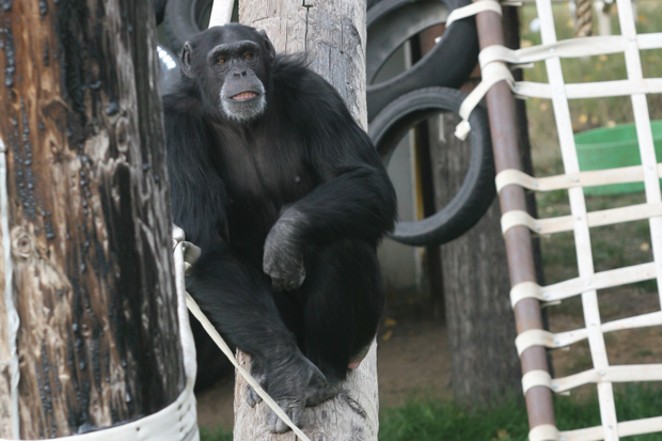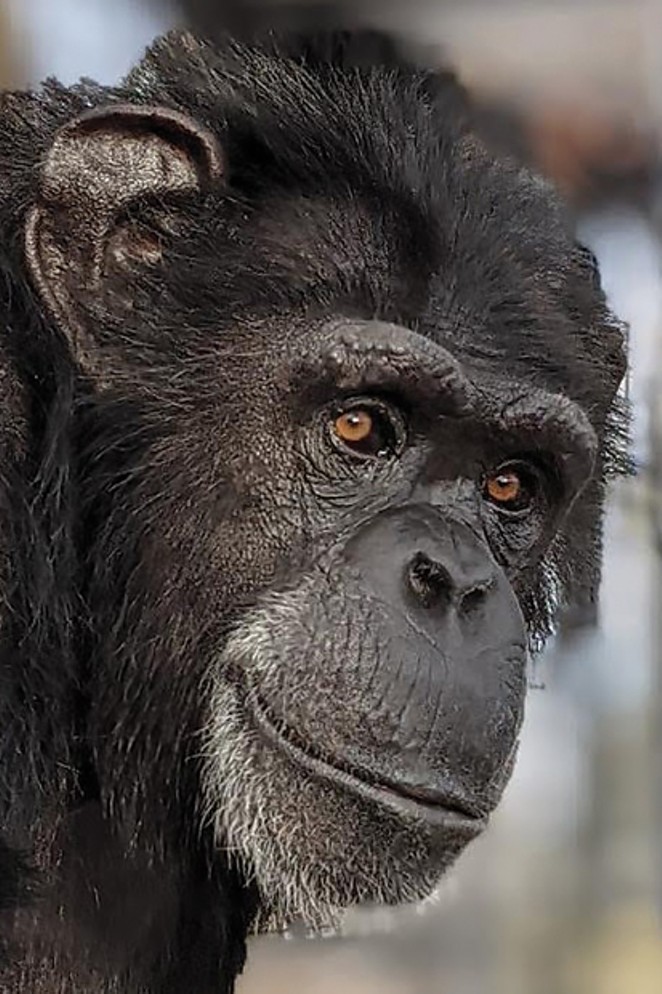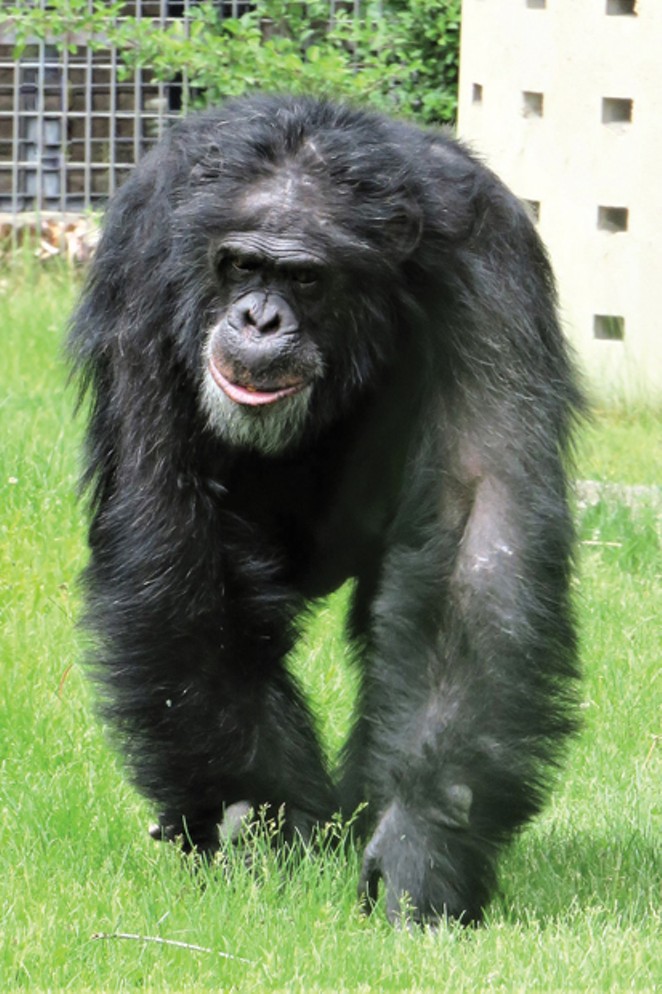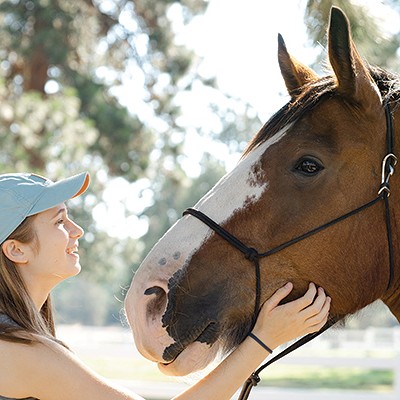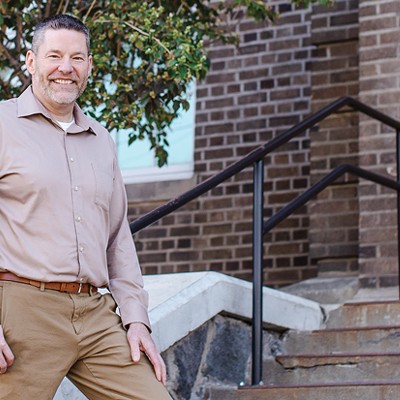Parents everywhere are familiar with this chaotic scene: Emma is playing with a favorite toy, when Jackson decides he wants to play with it too. He bops her on the head with a stick, distracting her just long enough to snatch the coveted item, and she shrieks in rage. But when his back is turned, she skillfully steals it back and runs away gleefully, delighted with her ingenuity.
Emma and Jackson are not human children—they are chimpanzees who live in Central Oregon. (Quick facts: chimpanzees are apes, not monkeys. There are only four species of great apes: chimpanzees, gorillas, orangutans and bonobos.)
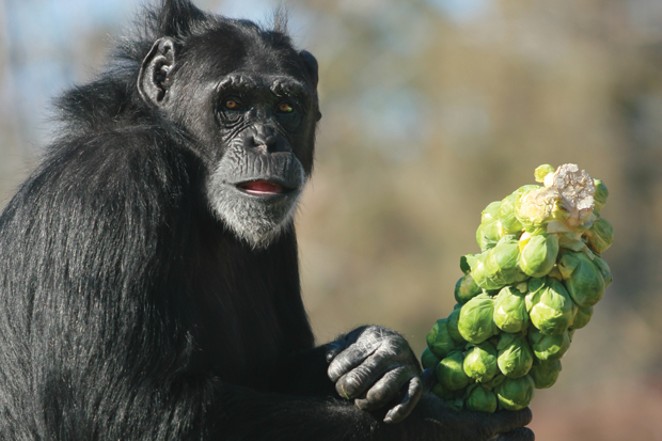
They, along with four other companions, live at a non-profit wildlife sanctuary called Freedom for Great Apes. Located in a quiet, peaceful setting in rural Tumalo, the facility was originally established in 1995 for the lifetime care and well-being of chimpanzees rescued from the pet trade and entertainment industry.
The sanctuary was taken over in 2019 by FGA, a committed group of professionals with expertise in primatology, safety and veterinary care whose mission is to further the welfare of all captive great apes through education and outreach. Sadly, many chimps have been exploited for profit and then discarded, creating a need for rescue organizations like FGA.
"We took on the care and operations of the sanctuary along with the original commitment to provide the chimpanzees with a lifetime of exceptional care," says Executive Director Paula Grendel. "In an ideal world, my job would not exist because there wouldn't be a need to rescue chimpanzees from the pet or entertainment industry. Unfortunately, FGA and a handful of other chimpanzee sanctuaries across the country still receive calls about 'pet' chimpanzees who need a safe sanctuary home because they have become too strong to live inside a house or be a pet after they have matured... Chimpanzees do not make good pets and should not be in entertainment."
Fortunately, FGA has stepped in to help these majestic animals. Spanning three outdoor enclosures full of rope swings and climbing structures, and over 3,300 square feet of climate-controlled indoor housing, their unique facility makes the perfect chimpanzee habitat. A series of elevated, accessible aerial tunnels with beautiful mountain views connect the outdoor and indoor units.
"The sanctuary was designed specifically for the individual and social welfare of the chimpanzees," says Grendel. "Chimpanzees in the wild live in communities of 15 to 150 individuals, although they travel and forage in smaller subgroups. Our facility design, with multiple enclosures of different sizes, allows the chimpanzees to make choices about who and where they want to spend their time."
Within the largest outdoor enclosure, aptly named the Big Outdoor, the chimpanzees can scale a 30-foot, tri-level tower built of fire house cargo nets and telephone poles, hide out in cool underground tunnels or colorful cement structures during blistering hot summer days, or hoot in excitement as they explore a simulated termite mound loaded with their favorite treats like peanut butter and ketchup.
If they tire of the outdoors, the chimps can scamper inside a two-story building with vaulted ceilings, skylights, heated floors and plenty more fire hoses and elevated platforms. Much like human children, building nests and blanket forts is a popular recreational activity that can keep the chimpanzees occupied for hours.
“The sanctuary was designed specifically for the individual and social welfare of the chimpanzees.”
tweet this
"In the wild, chimpanzees live both in trees and on the ground," explains Grendel. "At our sanctuary, the chimpanzees can make the choice on whether they want to spend time up high in the aerial tunnels, on elevated platforms, or build a nest in a shaded culvert. Also, because we live in Central Oregon, and the winters can get chilly, having large indoor habitats for the chimpanzees to run and play is just as important as having spacious outdoor habitats."
As omnivores, their diet in the wild is made up primarily of fruits, seeds, nuts, leaves, flowers and insects, according to the Jane Goodall Institute website. At the sanctuary, they receive three square meals a day of fresh fruits and vegetables, whole grains, and "primate biscuits" fortified with extra vitamins, minerals and protein.
Much like a growing teenager and their friends who quickly clean out a refrigerator, feeding six hungry mouths isn't easy. According to the John Ball Zoo, the average chimp consumes about 1,370 pounds of food every year (about the amount of the average American).
Fortunately, local providers generously donate weekly crates of fresh produce to the sanctuary. In fact, as the only chimpanzee sanctuary in Oregon, FGA subsists entirely on donations from the community and does not receive any federal or state funding.
"Amazingly, it costs approximately $20,000 a year to provide quality care for one captive chimpanzee," says Grendel. "We are so grateful for generous donations from people like you who care about the future of chimpanzees."
To stretch their grocery budget, the sanctuary has installed an organic garden and greenhouse, which allows them to grow lettuce, corn, tomatoes, cucumber and other tasty produce that chimps love to eat. Wild edible flowers and herbs, like marigolds, pansies, basil, and mint, also adorn the garden, allowing the chimps to frolic and forage.
For Grendel, "There's nothing more rewarding than hearing six chimpanzees pant and hoot with excitement when lunch is served or hear the happy lip smacking that comes when the chimpanzees are grooming each other. In these moments, you know in your heart that you are giving them the best chimpanzee life they can have."
The sanctuary also includes a main house next to the chimpanzee facilities to house their on-site caregiver and an educational center filled with informative books.
"Public outreach and education are an integral part of FGA's mission," says Grendel. "FGA runs an outreach program to any organized group in the community. We tailor programs for all age groups and offer presentations on a variety of chimpanzee conservation topics to school children or special groups. We provide educational tours for students to come see the sanctuary and meet the chimpanzees."
For Grendel, connecting with kids is a top priority; "The best outreach is through our own children because they are little sponges...they bring it back to their parents and to their friends who then hear it through their own eyes. I think that's our best education and outreach program."
Unfortunately, the pandemic has had a major impact on the sanctuary's operations and outreach efforts, particularly by minimizing volunteer visits and in-person fundraisers. Normally, FGA runs a dedicated volunteer program with opportunities for children and families to get involved on-site, but because chimpanzees are susceptible to Covid-19, these have been postponed.
However, Grendel stresses that volunteers have been able to help in other important ways, such as "making enrichment for the chimpanzees, delivering totes brimming with blankets, toys, and food, collecting cans as part of our Bottledrop fundraising program, and helping plan virtual fundraisers."
In alignment with their activist mission, FGA's website also hosts a petition to end the exploitation of primates worldwide and to stop the sale of chimpanzees as pets.
"I cannot undo the harm and trauma from their former lives as pets or entertainment chimpanzees before they arrived at the sanctuary, but I can offer them a safe home where they can recover and live their best chimpanzee life as they choose," says Grendel. "Through this work, I can be their voice and advocate for their freedom."
Quick Facts:
• Chimpanzees are apes, not monkeys.
• There are only four species of great apes: chimpanzees, gorillas, orangutans and bonobos.
• Chimpanzees in the wild live in communities of 15 to 150 individuals, although they travel and forage in smaller subgroups.
To learn more about chimpanzees or to get involved with volunteering or donating to FGA, please contact Paula Grendel at [email protected] or visit www.freedomforgreatapes.org

